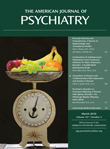Scientific breakthroughs such as the mapping of the human genome, innovative brain and neuroscience research, and a growing body of evidence regarding comorbidity between medical conditions (notably cardiovascular disease) and depression are challenging clinicians, researchers, educators, and policy makers to think systemically, systematically, and integratively about mental illness. The World Health Organization (WHO) World Mental Health Surveys: Global Perspectives on the Epidemiology of Mental Disorders is just such a systematic study and is breaking new ground in the field of descriptive psychiatric epidemiology—integrating data on prevalence, correlates, and treatment and generating new knowledge of significant utility for policy makers, educators, clinicians, researchers, and advocacy organizations.
The study editors are aware of the survey's depth and breadth but also of its "inevitable limitations," and hence they conceive of this pioneering project as only a beginning, an opening that would stimulate future such studies. They acknowledge the limitations resulting from the rigidity of existing diagnostic systems, cross-sectional data collections, and the use of fully structured rather than semi-structured clinical assessments. Other limitations include the survey's being based on household populations, thus excluding homeless people, which, in combination with possible systematic nonresponse and nonreporting, likely contributes to the results of this first generation of the WHO World Mental Health Surveys being an underestimate.
These limitations notwithstanding, the editors of the study and their global collaborators have produced a scientifically elegant and pragmatic volume. It is based on a well-orchestrated institutional collaboration between the WHO regional offices of the Americas, Africa, the Eastern Mediterranean, Europe, and the Western Pacific; the Data Collection Coordination Center of the University of Michigan Survey Research Center at the Institute for Social Research; the World Mental Health Data Analysis Coordination Center at the Department of Health Care Policy, Harvard Medical School; and scientific global collaborators.
The volume is organized into four sections—methodology, country-specific chapters, cross-sectional comparisons, and conclusions—addressing lifetime prevalence, age at onset, persistence, severity, patterns, and correlates of treatment, with a focus on anxiety disorders, mood disorders, impulse control disorders, and substance use disorders. The editors pay tribute to antecedent methodological precursors, such as the NIMH Diagnostic Interview Schedule, DSM-III, and ICD-10. These instruments, with their diagnostic criteria specificity, facilitated the development of the Diagnostic Interview Schedule, the culturally valid translation of the instrument into many languages, and the development of the Composite International Diagnostic Interview, first used in 1994 by Kessler and his team in the National Comorbidity Survey. It revealed, then, a high prevalence of mental disorders, widespread unmet treatment needs, and below par treatment adequacy.
The cross-national comparisons of the WHO project confirm, 15 years later, at a global level, the high prevalence of mental disorders, early age at onset, high comorbidity, substantive persistence, unmet treatment needs, significant delays between the onset and treatment, low treatment rates, and substandard treatment quality. It is noteworthy that in the U.S. sample of the survey, approximately 50% of psychiatric disorders exist by age 14, and 75% by age 24. Furthermore, most of the care (approximately 64%) is provided by nonphysicians, and of that provided by physicians, primary care physicians lead psychiatrists at a ratio of approximately 2:1. Indeed, significant barriers prevent primary care physicians from directing patients in need of psychiatric care to psychiatrists (
1).
The WHO World Mental Health Surveys project, in addition to its intrinsic value of providing valid and reliable evidence that may assist policy makers in the allocation of resources to address mental health needs at national and global levels, also has value added, especially for developing nations. This unprecedented project has provided mentorship and indirect infrastructure development, serving as a catalyst in the grooming of the next generation of research leaders, facilitating the inclusion of mental health in national health policies, and stimulating the process of the possible allocation of resources commensurate with the burden of disorders, thus strengthening health systems.
The editors acknowledge the gap that still needs to be filled between clinical practice and psychiatric epidemiology that was not fulfilled by this study. Future such studies should consider not only the "garden variety" mental and substance use disorders themselves but also their comorbidity with cardiovascular disorders, cancer, diabetes, depression, and other illnesses. Additionally, collaborative projects between researchers, clinicians, and policy makers regarding the translation, transmission, and application of this knowledge will likely be of mutual benefit.
This WHO report may serve as a catalyst in stimulating studies of modifiable risk factors, protective factors, and hypotheses that could be tested in naturalistic, quasi-experimental settings that could form the empirical foundation of future global epidemiologic studies. Existing retrospective risk factors studies, such as the Adverse Childhood Experiences Study (
2), may well inform future prospective studies of the benefits of closing the gap between clinical practice and psychiatric epidemiology, integrating primary care, mental health and public health, and including mental health in national and global health policies and across sectors.
Kessler, Üstün, and their excellent global team of WHO World Mental Health Surveys collaborators are to be commended for their vision, its execution, and their first steps of what promises to be a long and fruitful scientific journey.

